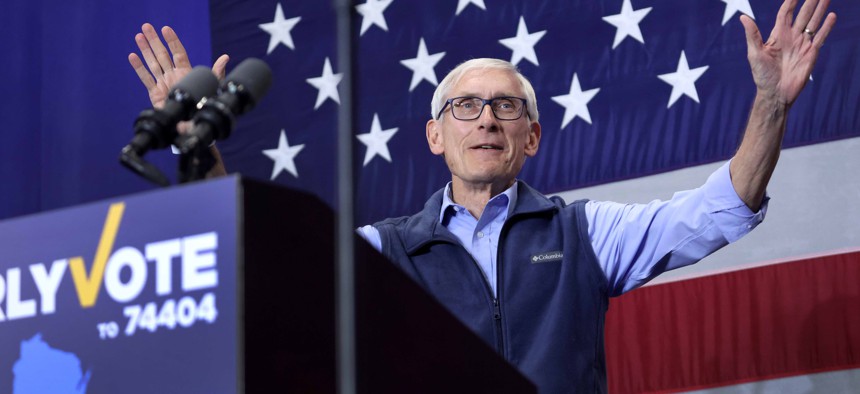A Governor Backs a Major Funding Boost for Counties and Cities

Wisconsin Gov. Tony Evers, seen here on the campaign trail last year, wants to send more state dollars to local governments. Photo by Scott Olson/Getty Images
His plan involves sharing 20% of state sales tax collections with localities and giving them more latitude to raise taxes.
Wisconsin Gov. Tony Evers wants to direct a fifth of the state's sales tax revenue to cities and counties while also giving them more leeway to raise local taxes, moves that the Democrat says will provide millions of dollars to help with costs in areas like transportation and public safety.
Evers' budget proposal would create a "new shared revenue appropriation" for cities and counties using the sales tax dollars. The change, according to the governor's office, would generate an estimated $576 million during the 2024-25 fiscal year, amounting to "the largest increase in aid to municipalities and counties in decades." Local governments in the state have been advocating for such a policy.
For years now, Evers said in a statement, Wisconsin localities "have been forced to do more with less."
"They’ve had to make impossible decisions about what essential services to fund in our communities, having to choose between paying for first responders, addressing PFAS, fixing the roads, and other critical priorities,” added the governor, who was elected to a second term in November. “The state must fulfill our obligation to ensure our local partners can meet basic and unique community needs."
Wisconsin's state sales tax is 5 cents for each dollar of spending and 68 counties in the state have adopted an additional 0.5% sales tax.
The governor's budget would also clear the way for Milwaukee County—the state's largest metro area—to levy an additional 1% sales tax, with half the revenue from it going to the city of Milwaukee. This proposal would require approval under a local voter referendum.
Similarly, Evers' plan would allow for other counties to raise sales taxes by 0.5% and for cities with over 30,000 residents to impose a sales tax at that level. These hikes would also require voter approval.
Evers' budget proposals will need to clear the Republican-controlled state legislature. The Associated Press reported that some aspects of the local revenue plans the governor has mapped out are similar to ideas top lawmakers are discussing, but that Assembly Speaker Robin Vos has voiced reluctance to send additional funding to Milwaukee without changes to the city's spending.
The governor, during his state of the state address last month, endorsed sending up to 20% of sales tax revenue back to localities. It's a policy that the Wisconsin Counties Association, the League of Wisconsin Municipalities and the state's towns association say they have been working closely with state leaders to get enacted.
“Both sides of the aisle seemingly agree that the current system of funding local governments in Wisconsin is broken, and everyone must come to the table to find a long-term solution," the groups said in a joint statement after Evers' state of the state address. "This issue transcends partisan politics. With rising inflation and increased demand for services, local governments require additional and sustainable state resources."
NEXT STORY: Top Sales Tax Trends to Watch in 2023






